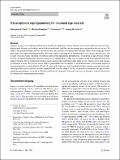Transcriptomic reprogramming for neuronal age reversal
Author(s)
Plesa, Alexandru M.; Shadpour, Michael; Boyden, Ed; Church, George M.
Download439_2023_Article_2529.pdf (1.016Mb)
Publisher with Creative Commons License
Publisher with Creative Commons License
Creative Commons Attribution
Terms of use
Metadata
Show full item recordAbstract
Abstract
Aging is a progressive multifaceted functional decline of a biological system. Chronic age-related conditions such as neurodegenerative diseases are leading causes of death worldwide, and they are becoming a pressing problem for our society. To address this global challenge, there is a need for novel, safe, and effective rejuvenation therapies aimed at reversing age-related phenotypes and improving human health. With gene expression being a key determinant of cell identity and function, and in light of recent studies reporting rejuvenation effects through genetic perturbations, we propose an age reversal strategy focused on reprogramming the cell transcriptome to a youthful state. To this end, we suggest using transcriptomic data from primary human cells to predict rejuvenation targets and develop high-throughput aging assays, which can be used in large perturbation screens. We propose neural cells as particularly relevant targets for rejuvenation due to substantial impact of neurodegeneration on human frailty. Of all cell types in the brain, we argue that glutamatergic neurons, neuronal stem cells, and oligodendrocytes represent the most impactful and tractable targets. Lastly, we provide experimental designs for anti-aging reprogramming screens that will likely enable the development of neuronal age reversal therapies, which hold promise for dramatically improving human health.
Date issued
2023-04-01Department
Massachusetts Institute of Technology. Department of Biological Engineering; Massachusetts Institute of Technology. Department of Brain and Cognitive Sciences; McGovern Institute for Brain Research at MIT; Howard Hughes Medical InstitutePublisher
Springer Berlin Heidelberg
Citation
Plesa, Alexandru M., Shadpour, Michael, Boyden, Ed and Church, George M. 2023. "Transcriptomic reprogramming for neuronal age reversal."
Version: Final published version